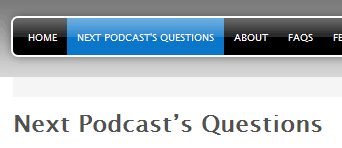Applying Web 2.0 to Podcasting
 I've been thinking about how simple, inexpensive ideas can be surprisingly successful. Like how Digg's founders basically started Digg with a $1,000, and converted it into a site worth millions:
I've been thinking about how simple, inexpensive ideas can be surprisingly successful. Like how Digg's founders basically started Digg with a $1,000, and converted it into a site worth millions:
Kevin Rose started Digg in December of 2004 with just $1000. Today Digg is one of the biggest news sites on the Net, with over 400,000 members and over 200 million page views per month. According to this article from Business week, Digg will make $3 million this year from a combination of Google AdSense and Federated Media ads.
Digg's model is simple: users contribute interesting stories, and then the same user community diggs or buries the stories. Digg aggregates the most dug stories on top. (Try setting your home page to Digg.com for a week -- you'll be hooked.)
I'd like to apply some similar Web 2.0 principles to podcasting. Currently podcasting is mostly an experience of listening. You put on the headphones and absorb the material, much like the early web was an experience of loading a site and reading the material.
How can we spin podcasting so that the audience participates more, and so that essentially the audience begins to drive the content?
At one time I encouraged listeners to call in and comment via phone, but hardly anyone did, and it wasn't very practical.
Here's my new idea: Each week during the podcast, I announce what the next podcast will be about. I then solicit questions from the listeners for the interview (e.g., what would you like me to ask X about topic Z).
Going one step further, I'll put a button on the homepage of Tech Writer Voices that says "Next Podcast: Ask Questions Now" or something.
My actual next interview will be on RoboHelp 6 (because it created such a controversy on Monkey PI). If you're wondering about some things related to RoboHelp 6, just submit the questions. I'll then ask your submitted questions to the interviewee.
This might be interesting, and it might flop. But hey, if I received 20 questions, then not only would it make the interview easier to prepare for, it would also make it more fun to listen to. It would have more community appeal.
I could also eventually do a Skypecast, which is like a mini conference call on Skype, but the quality apparently degrades when you add multiple callers.
About Tom Johnson

I'm an API technical writer based in the Seattle area. On this blog, I write about topics related to technical writing and communication — such as software documentation, API documentation, AI, information architecture, content strategy, writing processes, plain language, tech comm careers, and more. Check out my API documentation course if you're looking for more info about documenting APIs. Or see my posts on AI and AI course section for more on the latest in AI and tech comm.
If you're a technical writer and want to keep on top of the latest trends in the tech comm, be sure to subscribe to email updates below. You can also learn more about me or contact me. Finally, note that the opinions I express on my blog are my own points of view, not that of my employer.

